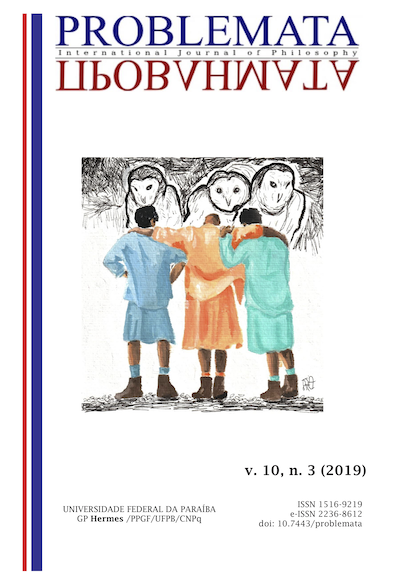BOBBIO GRAMSCI READER:
ELEMENTS FOR A GRAMSCIAN ELITE THEORY
DOI:
https://doi.org/10.7443/problemata.v10i3.49119Keywords:
Elite Theory, Democratic elitism, Antonio Gramsci, Norberto BobbioAbstract
The theory of elites, elaborated by Pareto, Mosca and Michels, is an undemocratic theory because it denies the founding principle of democracy, that is, the political competence of the citizens. The theory, however, admits several readings, including a democratic reading, which influenced in Italy liberal and antifascist’s authors like Gobetti, Dorso, Burzio, Einaudi, Croce, Salvemini.
Bobbio interprets this democratic strand of elitism not as a denial of the existence of democratic regimes, but as a realistic view of "democracy as it is" rather than idealistic of "as it should be." Bobbio thus fits in with authors who were inspired by the doctrine of democratic elitism, such as Hans Kelsen and Joseph Schumpeter.
From this perspective, Bobbio analyzes the influence that elitism had on the Italian and international socialist and communist left, in particular on Antonio Gramsci's thinking.
The present work discusses, from Bobbio, a possible “elitist” reading of Gramscian political thought, showing the critiques and profound differences that separate it from elitists, but at the same time the elements of an elitist Gramscian theory present in some concepts of its political conception: the intellectuals, the party, the hegemony, the historical bloc, the avant-garde/mass, intellectuals/people, rulers/governed relationship.
Downloads
References
BOBBIO, Norberto et alii. Dicionário de Política. Brasília: UNB, 1986.
BOBBIO, Norberto. Ensaio sobre a ciência Política na Itália, Brasília: UnB, 2002.
BOBBIO, N. Gramsci e os estudos políticos na Itália. In BOBBIO, N. Ensaios sobre Gramsci e o conceito de sociedade civil. Rio de Janeiro: Paz e Terra, 1999, p. 89-106.
BOBBIO, N. O filósofo e a política. Org. por José Fernandes Santillan. Rio de Janeiro: Contraponto, 2003.
CANFORA, Luciano. O mundo de Atenas. São Paulo: Companhia das Letras, 2015.
COUTINHO, C. N. De Rousseau a Gramsci. Ensaios de teoria política. São Paulo: Editora Boitempo, 2011.
DAHL, Robert. Poliarquia: participação e oposição. São Paulo: EDUSP, 1997.
FINOCCHIARO, Maurice A. Gramsci e Gaetano Mosca. In GIACOMINI Ruggiero, LOSURDO Domenico e MARTELLI, Michele (orgs). Gramsci e l´Italia. Napoli: Città del Sole, 1994.
GRAMSCI, A. Cadernos do Cárcere. 6 vols. Edição e tradução de Carlos Nelson Coutinho; coedição, Luiz Sergio Henriques e Marco Aurélio Nogueira. Rio de Janeiro: Civilização Brasileira, 2001.
GRAMSCI, Antonio. Quaderni del Carcere. Edizione critica dell´Istituto Gramsci. A cura di Valentino Gerratana. Torino: Einaudi, 2007. 4v. (Edizione elettronica a cura dell´International Gramsci Society).
HOLLANDA, Cristina Buarque de. Teoria das elites. Rio de Janeiro: Jorge Zahar, 2011.
KELSEN, Hans. Democracia. São Paulo: Martins fontes, 2000.
MOSCA, Gaetano. Elementi di scienza politica. 2. ed. Torino: F.lli Bocca, 1923.
PORTINARO, Pier Paolo. Il realismo politico. Roma-Bari: Laterza, 1999. Trad. espanhola: El realismo político, Buenos Aires: Editorial Nueva Visión, 2007.
SCHUMPETER, Joseph. Capitalismo, Socialismo e Democracia. Trad. Ruy Jungmann. Rio de Janeiro: Editora Fundo de Cultura, 1961, p. 300.
TOSI, G. Democracia, Liberalismo e Socialismo em Norberto Bobbio. Uma resposta a Vitullo e Scavo. Revista Interdisciplinar de Direitos Humanos. Bauru, v. 5, n. 2, p. 51-78, jul./dez., 2017 (9).
Downloads
Published
Issue
Section
License
Authors who publish with this journal agree to the following terms:
- Authors retain copyright and grant the journal right of first publication with the work simultaneously licensed under a Creative Commons Attribution License that allows others to share the work with an acknowledgement of the work's authorship and initial publication in this journal.
- Authors are able to enter into separate, additional contractual arrangements for the non-exclusive distribution of the journal's published version of the work (e.g., post it to an institutional repository or publish it in a book), with an acknowledgement of its initial publication in this journal.
-
- Authors are permitted and encouraged to post their work online (e.g., in institutional repositories or on their website) prior to and during the submission process, as it can lead to productive exchanges, as well as earlier and greater citation of published work (See The Effect of Open Access).





